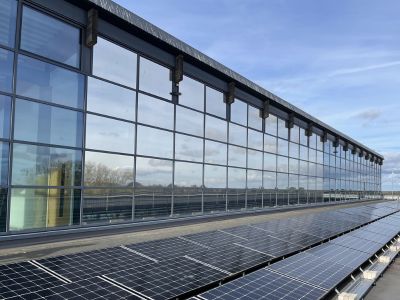West Suffolk Council agrees new strategy for achieving net zero target
20 May 2025

Cabinet has welcomed significant progress being made by West Suffolk Council to deliver ambitious net zero projects and agreed to adjust targets to account for national initiatives and funding.
The council’s strategic priority to improve West Suffolk’s environmental resilience has focused on helping households and businesses to decarbonise, as these are where the most carbon is emitted in the district. Schemes such as Solar for Business, the Decarbonisation Initiatives Fund and Warm Homes Suffolk are examples of how the council is helping businesses, community groups and residents struggling with the cost of living, to manage energy costs and achieving net zero emissions.
While, through these initiatives, the council already saves more carbon indirectly than it emits directly, new national demands mean the authority’s own target to achieve net zero must be moved back to a more realistic date.
A comprehensive review of the council’s progress towards net zero has identified areas for improvement, as well as taking resources, realistic progress and the associated costs of carbon reducing measures into account for the new timeline – the first fully-costed route-map produced for the council.
Government-led initiatives such as Simpler Recycling, increase the demand for new waste collecting vehicles where alternative technology for large rural areas are not yet practical to operate, which increases emissions associated with delivering key services.
Since declaring a climate emergency and setting 2030 as the initial target, the council has made significant progress in reducing emissions across its operations and with the wider community, and has already approved and funded ambitious plans to do more.
Cabinet agreed the new target on Tuesday 20 May, and discussed the positive action the council has already taken, including:
- West Suffolk Council’s own carbon consumption currently stands at just below 5,000 tonnes of carbon each year which is 13 per cent lower in absolute terms than in 2019 when the council first declared a climate emergency. The figure has continued to decrease despite increases in the council’s operational activities, for example providing waste collection services to a growing number of domestic properties.
- The council already saves more carbon indirectly than it emits directly. This is due to the Council’s activities to reduce the carbon consumed by third parties (for example, off-site renewable energy investments, grant schemes and recycling rates). These activities already prevent at least 7,000 tonnes of carbon a year from entering the atmosphere.
- The council has already secured and/or provided funding to remove a further 1,000 tonnes of its own carbon emissions (20 per cent of the balance) before 2029, and plant 5,000 new trees.
- Some 1,540 tonnes of the council’s remaining carbon emissions (30 per cent) is from grid electricity, meaning that the council’s emissions from electricity consumption will naturally reduce as the National Grid gets greener as part of national plans.
To adjust for the new responsibilities and services the paper recommends revising the target date for achieving net zero carbon emissions, from the original 2030 goal to a new target of 2039.
West Suffolk Council remains fully committed to achieving net zero. The new target reflects a more deliverable timeline that allows the council to adopt the new trajectory and revised net zero target of 2039, as the basis for monitoring the Council’s future progress in carbon reduction.
Cllr Gerald Kelly, Cabinet Member for Governance, Regulatory and Environment at West Suffolk Council, said: “2030 was an ambitious aim, and pushing ourselves to hit that target has put us in the strong position we are in today. But it has become clear that due to elements out of our control, we now need a more realistic plan to achieve net zero, and being honest about that fact is a key part of maintaining trust in this agenda. The revised target allows us to keep the momentum and optimism for tackling climate change going and continue to make significant progress.
“The council will continue to reduce the carbon consumed by third parties, already preventing at least 7,000 tonnes of carbon a year from entering the atmosphere, meaning the council already saves more carbon indirectly than it emits directly.
“The new trajectory includes decarbonising the leisure centres in Bury St Edmunds and Haverhill, installing solar canopies at the Mildenhall Hub car park, to name a few projects that are currently in the works.”
Cabinet agreed on the framework for how net zero could be achieved within the new timescale if funding allows, and how it will be used as a tool to monitor progress and inform future investment decisions made by West Suffolk Council or any successor unitary authority.
Posted in categories: press release, news, environmental-news
